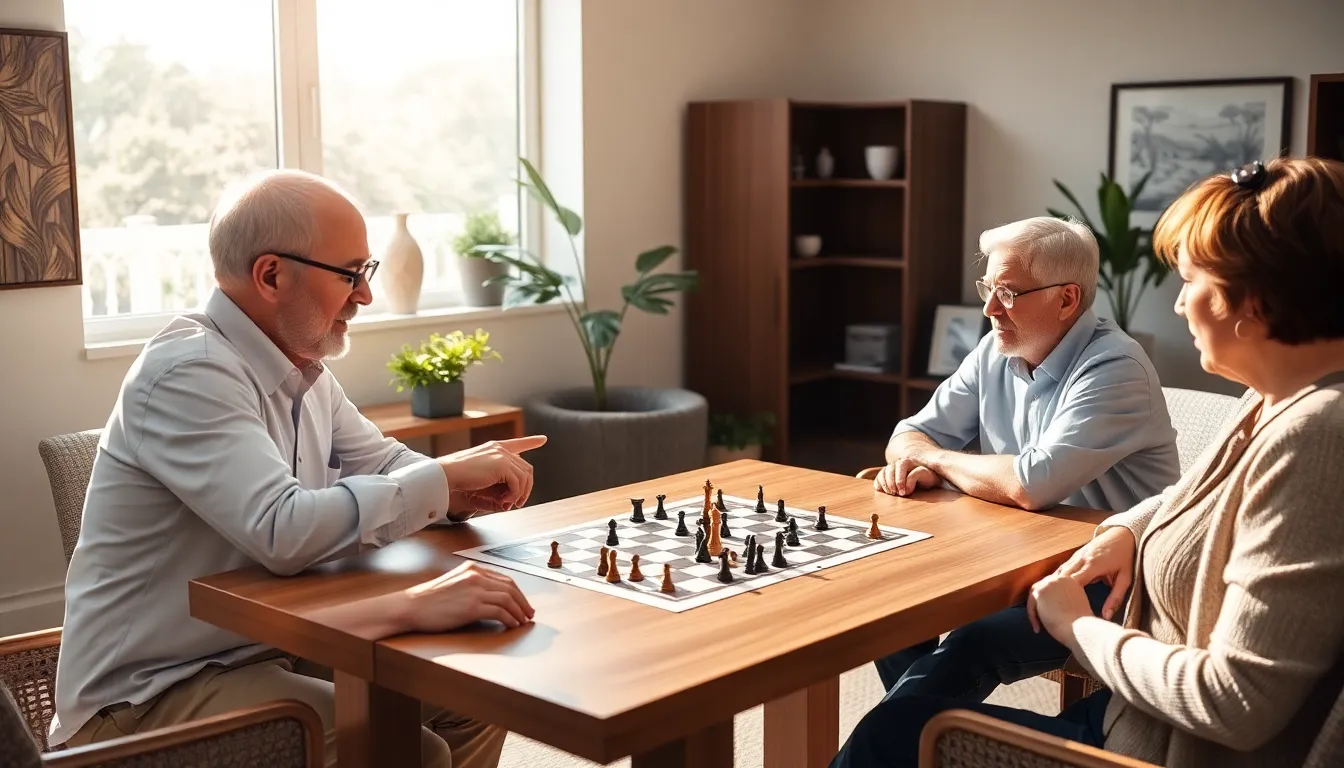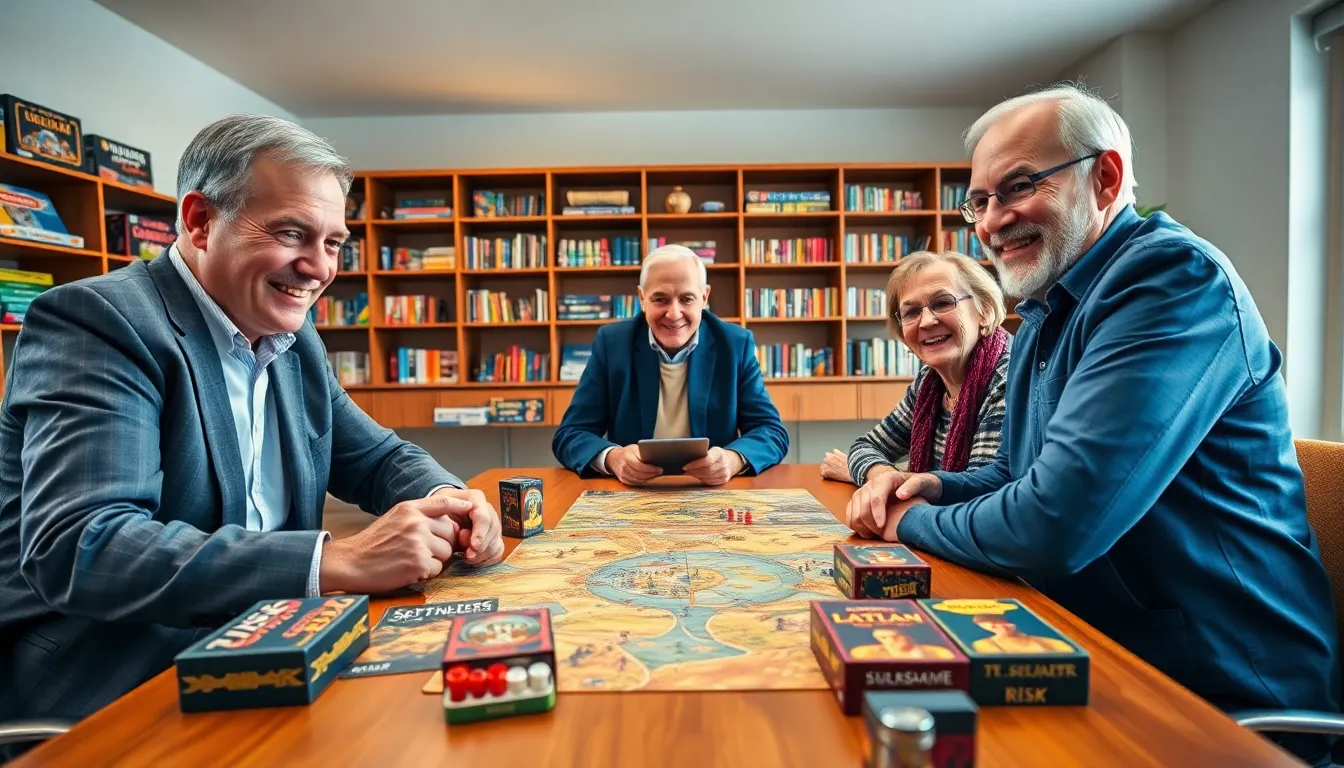Imagine a room filled with laughter, the sound of friendly banter, and a few friendly grumbles about underhanded tactics. Welcome to the world of war games for elders. Yes, you heard that right. These engaging activities are perfect for keeping the brain sharp while having a blast. There’s nothing wrong with a little playful combat, especially when it comes to our loved ones. So, tuck in your napkin, grab your game piece, and let’s jump into why these games are essential for seniors.
Table of Contents
ToggleBenefits of War Games for Seniors

War games for seniors come with a plethora of benefits that go beyond just entertainment. They provide tools for cognitive enhancement and physical engagement, making them a solid choice for elder activities.
Cognitive Enhancements Through Strategy Games
Strategic thinking isn’t just for the young and spry. War games encourage players to think critically and plan ahead. Seniors often experience cognitive decline, so engaging in this type of mental gymnastics can help maintain their memory and problem-solving skills. According to various studies, strategy games can enhance cognitive functions such as processing speed, reasoning, and attention span. So, what’s better than outsmarting your opponent and keeping your brain in peak condition?
Physical Engagement and Coordination
While most people think of the brain when discussing games, let’s not forget about physical engagement. Some war games require players to move pieces or cards around, promoting hand-eye coordination. For seniors, this can be an enjoyable way to maintain dexterity and even improve their motor skills. Who knew that war could lead to better coordination? No one’s saying they’ll win a marathon, but a little movement can go a long way.
Social Interaction and Community Building
Engagement in war games isn’t just about cognitive benefits: the social component can be just as impactful. Playing games fosters communication among players, allowing seniors to share stories, jokes, and, of course, a little friendly rivalry. Isolation can be a significant issue for elders, especially those living alone. By participating in group gaming sessions, seniors can forge connections, build friendships, and even develop a sense of belonging. What’s more heartwarming than seeing someone come alive during a spirited game night? In essence, these games act as a bridge to create communities, making the world a little less lonely.
Popular War Games Suitable for Elders
If you’re looking for the right games to introduce, the variety is impressive. Here are some popular options to consider:
Board Games
Board games have stood the test of time, and many have a strategic component that seniors love. Classics like “Risk” or “Settlers of Catan” put players in the heat of battle and require sound decision-making. Also, they bring a tactile element that can be comforting for older players.
Card Games
Don’t underestimate the power of a simple deck of cards. Games like “Bridge” or “Hearts” are not just entertaining but also allow for a good amount of interaction and strategic planning. Plus, card games are portable. Whether at home or on a day out, they can be played almost anywhere, bringing fun whenever needed.
Digital and Online Options
In today’s digital age, there are numerous online platforms where seniors can jump into war games without leaving the comfort of their homes. Websites like Tabletopia and Board Game Arena create a virtual gaming environment. This way, seniors can play against family members or friends located in different areas, all while keeping their competitive spirits alive. Plus, digital games often offer tutorials that can help new players get into the swing of things without feeling overwhelmed.
How to Introduce War Games to Seniors
Introducing war games to seniors may require a bit of finesse. Thoughtful preparation can ensure that they have an enjoyable experience from the get-go.
Setting Up the Environment
A comfortable and familiar environment is crucial. Make sure the area is well-lit and free from distractions. Having a cozy setting can make participants more willing to engage. If possible, use a dining table or a similar setup where everyone can gather and still see each other, this adds to the camaraderie.
Choosing the Right Game
Not all games are created equal. It’s essential to consider the interests and cognitive abilities of the participants. Pick games that match their skill level and preferences. Starting with simpler games before moving to complexity allows seniors to ease into the fun without feeling overwhelmed. After all, it’s not just about winning, it’s about enjoying the ride.
Encouraging Participation and Involvement
As you introduce war games to seniors, encouraging their participation becomes vital. Show enthusiasm and celebrate their victories, no matter how small. Some may feel reluctant, thinking they won’t understand the rules or might lose. Offering patience, practice sessions, and encouragement ensures everyone feels like a valued player. Creating a positive atmosphere will inspire confidence, solidifying the game’s appeal. Remember, it’s all about the fun, even a little competition can be thrilling.
Tips for Facilitators and Caregivers
Facilitators and caregivers play a critical role in making war games successful for seniors. Keeping a few tips in mind can ensure an enjoyable experience:
- Be Patient: Some seniors may take longer to grasp rules, and that’s perfectly okay. A little bit of extra coaching can help.
- Choose Games Wisely: Always factor in the participant’s cognitive and physical abilities when selecting games.
- Foster Communication: Encourage players to discuss strategies and share anecdotes during the game. This can enhance the overall experience and deepen connections.
- Celebrate Variations: Not every game needs to be strictly competitive. Sometimes cooperative war games can be equally engaging and fun.

